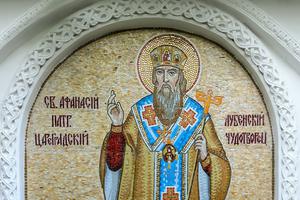Mighty Casey and American Humility
St. Alphonsus Liguori makes the comment in his book The Incarnation, Birth and Infancy of Jesus Christ that Jesus was born “in poor ragged clothes, in a stable lying on straw in a manger for animals,” because “he came to destroy the pride that had been the cause of man’s ruin.”
Pride is the most pernicious of the seven deadly sins. It directs us to focus on what is peripheral and ignore what is central. It greatly impairs our ability to discern reality’s order of moral priorities. In displacing humility, it turns aside the essential lesson associated with the circumstances of Jesus’ birth.
No doubt it was because of their affection for St. Alphonsus Liguori that a Pennsylvania couple named their son after him. And the young Alphonsus learned about hardship and poverty at an early age. He was orphaned when he was 11 and as a consequence, in order to support his brothers and sisters, went to work as a mule boy in the anthracite coal mines of Scranton, Pa. He labored during the day and studied at night, poring over his high school studies.
We get a stark glimpse of the harshness of life in a Scranton coal mine from the pen of Stephen Crane, author of The Red Badge of Courage:
“Before us stretched an inscrutable darkness, a soundless place of tangible loneliness. … Man is in the implacable grasp of nature. It has only to tighten slightly, and he is crushed like a bug. His loudest shriek of agony would be as impotent as his final moan to bring help from the fair land that lies, like heaven, over his head.”
A mine, a cave or a manger is a good place to learn humility, as well as vulnerability. Alphonsus never forgot those lessons he learned in his youth. He graduated from high school and in his 30s earned a law degree. He then set up a law practice representing miners in their claims against the company.
His son, Robert, achieved enough distinction in his life to justify writing an autobiography. Robert informs us of his earliest memories of the scarred hands of his father. He revered the legacy that Alphonsus brought to him from the mines of Scranton that included a visceral identification with the weak and the vulnerable.
It seemed perfectly logical in Robert’s mind to extend the special empathy he learned from his father to the most weak and vulnerable of all God’s human creatures, the unborn. Abortion, he would say, is not a question of when life begins. It is a question of when love begins.
“No insignificant person was ever born,” he stated, “and no insignificant person ever dies.”
In due time, Robert became the auditor general for his state. From this position of experience and accomplishment, he ran for governor but was thrice defeated. His opponents gloated over “the three-time loss from Holy Cross.” But Robert knew about hardship and the will to go on.
He ran again, in 1986, with the slogan, “Bob Casey is back — and so is Pennsylvania.” He won by a narrow margin. Four years later, he was re-elected, defeating Barbara Hafer, a pro-abortion Republican. His margin of victory was more than a million votes, carrying 66 of 67 Pennsylvania counties.
He continued to do as much as he could to protect the unborn. But Planned Parenthood sued him over his state’s Abortion Control Act. Gov. Casey fought valiantly to offer the unborn as much protection as possible, given the tight restrictions imposed by Roe v. Wade. The Supreme Court heard the case in 1992, prompting the governor to declare: “In this debate, who speaks for the child? Today I have come to say that Pennsylvania speaks for the child.”
As a man of humility, he deplored what he called the “Cult of the Imperial Self.” As a man of the people, he detested discrimination of any kind.
Casey had aspirations for challenging Bill Clinton in 1996 for the presidency of the United States. But his health began to wane. He suffered from a disease called “familial amyloidosis” that ultimately led to a heart-liver transplant. In the aftermath of his remarkable recovery, which extended his life and his trials by two years, The New York Times dubbed him a “folk hero” for his courage and determination.
A challenge for the presidency was not to be his. On May 30, in the year 2000, Robert Casey passed from this world. He left behind a large brood of children and grandchildren that one writer referred to as the “G-rated version of the Kennedys.”
With Casey’s passing, as Princeton University’s Robert George wrote, “The pro-life movement has lost a champion, the Democratic Party its conscience, and American politics a model of principled statesmanship.”
It takes a man of humility to be a man of magnanimity. This is the central irony of the moral law. The man of pride can neither see straight nor love right. There is a moral line that flows from a stable in Bethlehem to a doctor of the Catholic Church to a young Scranton coal miner and his numerous descendents that offers us the hope that humility will one day save the world.
Donald DeMarco is adjunct professor at
Holy Apostles College & Seminary in Cromwell, Connecticut.
- Keywords:
- July 1-7, 2007














